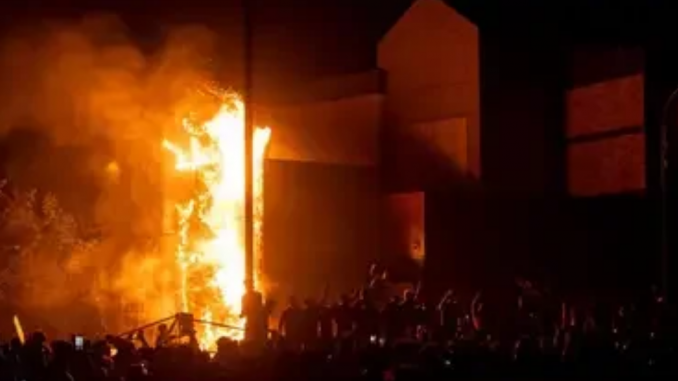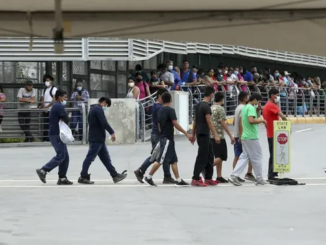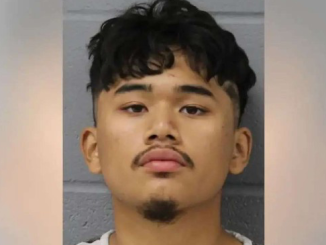
Which person is more violent and more of a security threat? Richard Barnett, the man without a prior criminal record who put his feet up on House Speaker Nancy Pelosi’s desk, or Bryce Michael Williams, one of the men who burned a Minneapolis police station to the ground last May?
Well, in the eyes of our two-tiered justice system, burning police stations in pursuit of BLM’s anti-police agenda is somewhat understandable and deserves a weak sentence, while putting one’s feet on Pelosi’s desk requires one to be held without bail!
Over the past few months, we’ve witnessed one person after another being held without bail, and even beaten in prison or held in solitary confinement for nothing more than disorderly conduct or public trespassing charges for what occurred at the U.S. Capitol on Jan. 6. Yet, Americans have forgotten that among all the horrific violence BLM has unleashed on this country, they burnt a police station to the ground. So, what was the punishment for the perpetrators?
On Monday, Judge Patrick Schiltz, a federal judge from the U.S. District of Minnesota, sentenced Bryce Michael Williams to just 27 months in prison for his role in holding the Molotov cocktail that torched the Third Precinct Police Station. Despite describing Williams as a leader — “not a follower” — in the violent mob that destroyed the station on the night of May 28, 2020, Judge Schiltz said Williams was a “good person who made a terrible mistake.”
What’s more appalling is that Schiltz now created a new precedent for more “sympathetic” violent crimes if the goal behind the violence is endorsed by “the system.” The judge added that it was “easy to understand” why the killing of George Floyd had affected Williams.
Given the way the system feels about a man like this, you can bet your bottom dollar that Williams will be eligible for all the early time credits and will easily be released after serving a year or so. Even the other three convicts — Davon De-Andre Turner, Dylan Shakespeare Robinson and Branden Michael Wolfe — were only sentenced to three or four years for their role in the fire. To begin with, it’s shocking how only four people were charged for the premeditated destruction of a police station. Applying the Jan. 6 standard, there would have been hundreds of people arrested, held without bail, and likely sentenced to 30+ years.
Judge Schiltz said he was giving Williams less time because he was the last to plead guilty and cooperate with the prosecution. But he was also the one caught most prominently with the explosives on surveillance camera. According to the Star Tribune, Judge Schiltz’s statement almost implied that he had to justify any prison time for Williams.
“But Schiltz said Williams’ role in the violence warranted prison time, and that Williams had no idea how many people may have been in the building, including good police officers and those who didn’t work in law enforcement, when he recklessly lit it on fire,” the Star Tribune reported.
In other words, had he merely torched a police station to the ground with the certainty that nobody was in there (or only “the bad” police officers), Williams would have only gotten probation, as requested by his legal defense team.
Now think about Richard Barnett, the man who posed for a picture on Jan. 6 with his feet up on Nancy Pelosi’s desk. There was never a moment when he was attempting to murder anyone or burn down the building, yet he was held pre-trial without any bail for four months! He also claims in an interview that he was held in solitary confinement for 23 hours a day and others in his position were beaten by prison guards.
Earlier this week, five GOP senators sent Attorney General Merrick Garland a letter decrying the double standard between the way his department has treated the Antifa/BLM protesters, who attacked a federal court house in Portland, and the Jan. 6 protesters:
Despite these numerous examples of violence occurring during these protests, it appears that individuals charged with committing crimes at these events may benefit from infrequent prosecutions and minimal, if any, penalties. According to a recent article, “prosecutors have approved deals in at least half a dozen federal felony cases arising from clashes between protesters and law enforcement in Oregon last summer. The arrangements — known as deferred resolution agreements — will leave the defendants with a clean criminal record if they stay out of trouble for a period of time and complete a modest amount of community service, according to defense attorneys and court records.” DOJ’s apparent unwillingness to punish these individuals who allegedly committed crimes during the spring and summer 2020 protests stands in stark contrast to the harsher treatment of the individuals charged in connection with the January 6, 2021 breach of the U.S. Capitol Building in Washington, D.C. To date, DOJ has charged 510 individuals stemming from Capitol breach. DOJ maintains and updates a webpage that lists the defendants charged with crimes committed at the Capitol. This database includes information such as the defendant’s name, charge(s), case number, case documents, location of arrest, case status, and informs readers when the entry was last updated.8 No such database exists for alleged perpetrators of crimes associated with the spring and summer 2020 protests. It is unclear whether any defendants charged with crimes in connection with the Capitol breach have received deferred resolution agreements.
Also, consider the fact that almost all the Jan. 6 protesters had clean records, while many BLM protesters were career criminals, which should have factored into pre-trial holding decisions. Furthermore, consider the magnitude of damage. During a plea hearing for one of the Capitol Hill defendants, the government said damages at the Capitol totaled around $1.5 million. Contrast that to the projected $1-$2 billion in insurance claims filed from damage stemming from the BLM riots in 2020.
The letter, which was signed by Sens. Ron Johnson (R-Wis.), Mike Lee (R-Utah), Ted Cruz (R-Texas), Rick Scott (R-Fla.) and Tommy Tuberville (R-Ala.), ends with 18 pointed questions juxtaposing the treatment of the BLM riots to the Jan. 6 Capitol breach. For example, they want to know how many BLM protesters were held without bail, held in solitary confinement, or offered deferred resolution agreements as compared to Jan. 6 protesters. They also inquired as to how much technology was utilized in identifying BLM rioters and how many prosecutors and FBI agents were assigned to those cases as compared to Jan. 6 cases.
We were always a nation of political will, not a nation of laws. However, in the past there was some degree of balance in that political will within the confines of law. Today, your politics and identity mean everything. Equal protection under the law is dead.
*story by The Blaze


